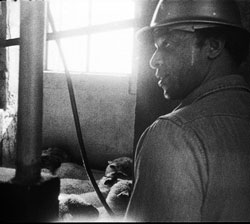 |
| Manohla Dargis of The New York Times calls Killer of Sheep "an American masterpiece, independent to the bone." |
This year's African Heritage Month film screenings at the gallery will showcase that tradition of "black films made for black audiences outside of any Hollywood influence," beginning with the much-revered but little-seen Killer of Sheep, by Charles Burnett.ย Burnett's 1977 MFA thesis project is cited as one of the "100 Essential Films" by the National Society of Film Critics, and was among the first 50 films selected for the Library of Congress National Film Registry.ย The film had been beautifully restored and blown up to 35 millimeter seven years ago, but it was only last year that the music rights were settled and the film could be shown in theatres and released on DVD.
|
"You never hear of the black reality of Los Angeles, except for the Watts riots and the Rodney King riots," says Macdonald, noting that he chose this month's Tuesday screenings to fit in with this term's Wednesday night "City In the Cinema" series.
The February series will also include two films by the better known but equally talented Spike Leeโ€”1989's Do the Right Thing, and the four-hour HBO documentary When the Levees Broke, which details in "very powerful" fashion the destruction that Hurricane Katrina wrought on New Orleans.
"Everybody knows about what happened in New Orleans with Katrina, but nobody wants to put it on the recordโ€”but he does."
